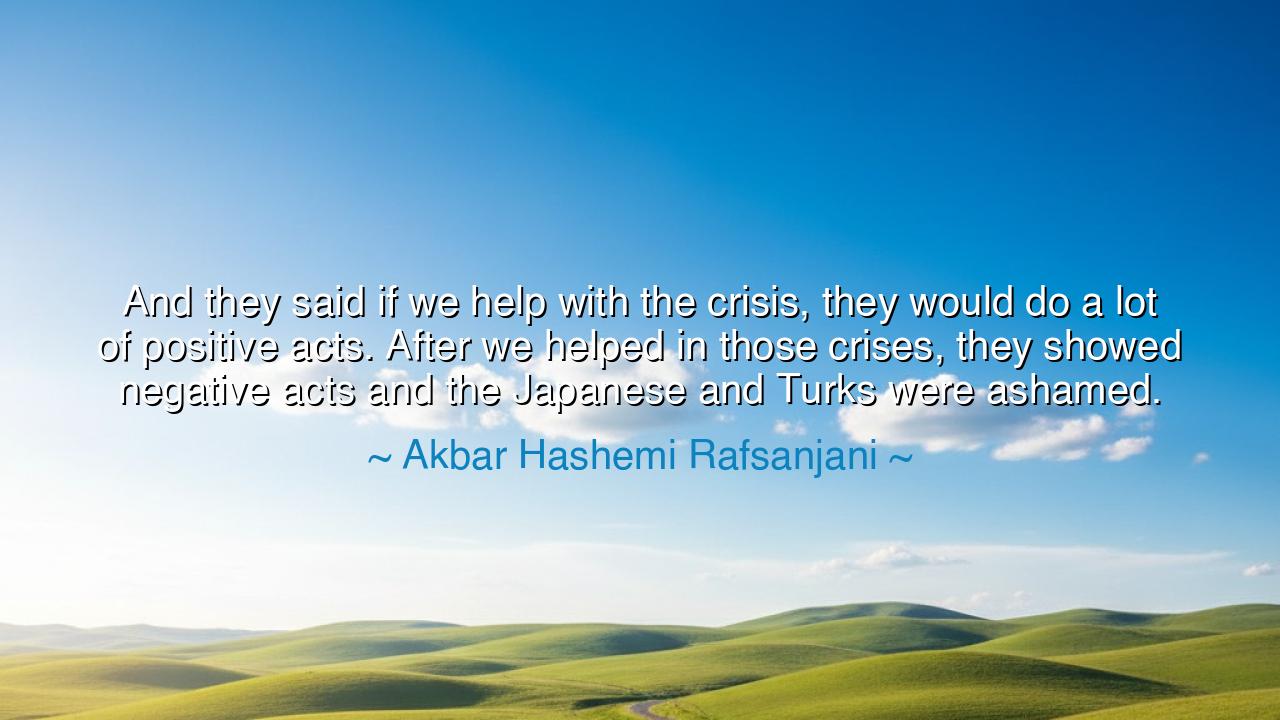
And they said if we help with the crisis, they would do a lot of
And they said if we help with the crisis, they would do a lot of positive acts. After we helped in those crises, they showed negative acts and the Japanese and Turks were ashamed.






The words of Akbar Hashemi Rafsanjani, “And they said if we help with the crisis, they would do a lot of positive acts. After we helped in those crises, they showed negative acts and the Japanese and Turks were ashamed,” are a lament born from betrayal. In them lies the bitter truth that promises made in desperate hours often dissolve when the storm has passed. To offer help in trust and then witness ingratitude is among the deepest wounds of politics and human dealings alike.
In the ancient spirit, these words echo the age-old tale of alliances broken and vows forgotten. Nations, like men, swear brotherhood when fire surrounds them, yet when safety returns, self-interest awakens and honor is forgotten. Rafsanjani calls forth the shame not of his own people, but of others—of the Japanese and Turks, who stood as witnesses to the dishonor of those who received help yet repaid it with treachery. His words remind us that true nobility is tested not in crisis, but in gratitude afterward.
History bears witness in the story of Athens and Sparta. When the Persians threatened Greece, the cities swore unity to defend their land. Yet, after victory, rivalries reawakened, and allies who had once fought shoulder to shoulder turned on one another. The Peloponnesian War followed, undoing the glory they had gained together. Like Rafsanjani’s lament, this tale shows how crisis breeds unity, but peace reveals the seeds of selfishness and betrayal.
Rafsanjani’s words also reveal the sorrow of trust misplaced. To help another in need is to bind oneself in duty and honor. But when those who are saved repay kindness with harm, the shame does not fall only on them, but upon those who stood witness. Thus the Japanese and Turks were “ashamed,” not because they betrayed, but because they saw honor cast aside by others and felt the sting of dishonor upon the whole company of nations.
So let this wisdom endure: promises made in the hour of crisis are sacred, for they are born of desperation and trust. To break them is to heap shame not only upon oneself, but upon all who watched and believed. Rafsanjani’s words are both rebuke and warning: gratitude is the measure of true character, and betrayal after aid is among the greatest disgraces. Let every generation remember that noble deeds must be answered with noble hearts, lest the world itself be covered in shame.






VNBach Viet Nguyen
This quote brings to light the often unspoken disappointment that arises from unfulfilled promises in international relations. It seems like a reflection of how diplomacy can be more transactional than altruistic. When nations offer help, they may expect something in return, but when that expectation is not met, it can lead to negative consequences. How do we ensure that international aid is used with integrity and that promises made during crises are kept?
HPPham Hoang Phuc
The idea that a country would offer help expecting positive actions in return, only to be disappointed, makes me think about the nature of international diplomacy. Are countries genuinely interested in helping each other, or are they simply playing strategic games? Is this a common feeling among nations who help others, only to feel that they are taken advantage of? What steps can we take to create more authentic and transparent global cooperation?
GHBui gia huy
Rafsanjani’s words seem to reveal the disappointment that comes when international cooperation is manipulated or falls short of its promise. What does it mean for a country’s reputation when it fails to live up to its commitments, especially after receiving help during a crisis? Does this speak to a deeper issue in how global politics operates, where promises are made to win support but aren't honored once the situation changes?
BTNguyen Ngoc Bao Thu
I find this quote interesting because it paints a picture of disillusionment with the idea of international support leading to positive outcomes. When promises are made and later broken, it can lead to a loss of trust. Could this be a reflection of the cynical view many hold about international aid, where it's often seen as self-serving? How can we ensure that help given in crises is genuinely reciprocated and not used for ulterior motives?
PTTran Thi Phuong Trinh
This quote seems to reflect the harsh reality of geopolitical interactions, where actions don't always match the promises made. The idea that the Japanese and Turks felt ashamed suggests that there was a recognition of the discrepancy between what was promised and what was delivered. How often do countries offer aid expecting nothing in return, only to be let down? What can be done to foster more genuine cooperation on the global stage?